No Justice a Year After a Journalist’s Murder
Solid evidence shows the bullet that killed Shireen Abu Akleh was fired by the Israeli Army. FILE - A memorial mass for slain Al Jazeera correspondent Shireen Abu Akleh is held at a church ahead of the first anniversary of her death, in the east Jerusalem neighborhood of Beit Hanina, Sunday, May 7, 2023. Abu Akleh, a Palestinian-American reporter who covered the Mideast conflict for more than 25 years, was shot dead on May 11, 2022 during an Israeli military raid in the West Bank town of Jenin. (AP Photo/Mahmoud Illean, File)
FILE - A memorial mass for slain Al Jazeera correspondent Shireen Abu Akleh is held at a church ahead of the first anniversary of her death, in the east Jerusalem neighborhood of Beit Hanina, Sunday, May 7, 2023. Abu Akleh, a Palestinian-American reporter who covered the Mideast conflict for more than 25 years, was shot dead on May 11, 2022 during an Israeli military raid in the West Bank town of Jenin. (AP Photo/Mahmoud Illean, File)
On May 11, 2021 journalist Shireen Abu Akleh and a handful of other reporters approached an Israeli convoy in the occupied West Bank wearing bright blue “PRESS” vests. They were looking to interview witnesses to an earlier firefight between the Israel Defense Forces and Palestinian forces when a new burst of gunfire broke out, reports The New York Times. Witnesses describe seeing Abu Akleh crouched behind a tree, and soon after that facedown on the ground. She’d been shot in the back of the head.
Following the incident, the Israeli government admitted it was possible Akleh had been killed by a stray Israeli bullet, but also claimed it may have come from a Palestinian gunman. However, footage released last year shows that there wasn’t any fighting before the attack. The video shows people chatting and laughing when six shots ring out in quick succession. The bullet that hit the back of her head was “well aimed,” a United Nations forensics report concluded, suggesting that Akleh had been executed. An analysis by Forensic Architecture, a firm specializing in on-the-ground evidence, concluded that the shooting was “fully intentional.”
“Is anyone injured,” a bystander, Sleem Awad, yelled, according to the Times. “Shireen! Shireen!” he yelled.
The bullet that hit the back of her head was “well aimed,” a United Nations forensics report concluded, suggesting that Akleh had been executed.
Abu Akleh was well known in the occupied territories for the stories she told about the people who lived there. After working for a series of publications, she landed at Al-Jazeera, the outlet she was reporting for on the day she died. Her list of accomplishments is long: Known as “The daughter of Palestine,” she was one of the first female anchors to report from the Arab world. She covered multiple wars and the second Intifada. She reported on four separate large-scale Israeli attacks on the Gaza Strip.
Her cousin recalled her commitment to the Palestinian people.
“My cousin, Shireen Abu Akleh, an American-Palestinian, had become a hero in Palestine,” she wrote in the Boston Review. “For decades she showed us not just the suffering of Palestinians, but their bravery, their perseverance and their desire to live in freedom and dignity.”
The last time she saw her cousin they’d chatted about her kids and looked forward to traveling and seeing each other after the pandemic. “We discussed how next time she’d spend more time with the kids, and we’d bring our dogs — who we decided would be great friends,” the cousin recalled. “She told me she was working on a story about sports in Palestine. I told her I would show the report to my son. It was the last feature she completed.”
The U.S. media is not known for its sympathy towards Palenstians, but as the evidence of Israeli culpability grew, The New York Times and The Washington Post undertook deep-dive investigations. After reviewing videos and audio recordings, inspecting the site and speaking to multiple witnesses, both publications determined that the bullets had come from an Israeli military vehicle. Israel refused to conduct a military investigation, despite urging from the U.S. State Department, which also concluded the bullets had come from the convoy.
In a CNN interview on the anniversary of her death, IDF spokesperson Daniel Hagari offered a semi-apology while refusing to address the question of whether Akleh had been targeted intentionally. “She was a journalist, a very established journalist,” he told CNN. “In Israel we value our democracy and in a democracy we see high value in journalism and in a free press. We want journalists to feel safe in Israel, especially in war time, even if they criticize us,” he added.
According to the Committee to Protect Journalists, at least 20 journalists have been killed by Israeli forces in the past two decades.
Your support matters…Independent journalism is under threat and overshadowed by heavily funded mainstream media.
You can help level the playing field. Become a member.
Your tax-deductible contribution keeps us digging beneath the headlines to give you thought-provoking, investigative reporting and analysis that unearths what's really happening- without compromise.
Give today to support our courageous, independent journalists.

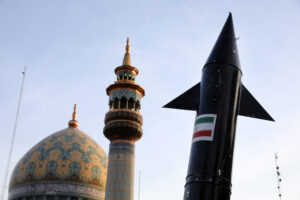
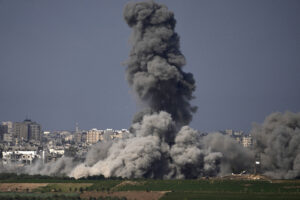
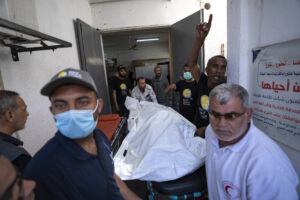
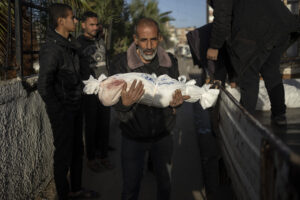
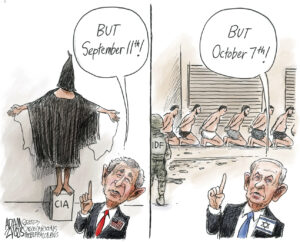
Sorry for the repetition - I thought I had the 2nd “clip” removed before I hit “Send.”
"In a CNN interview on the anniversary of her death, IDF spokesperson Daniel Hagari offered a semi-apology while refusing to address the question of whether Akleh had been targeted intentionally. “She was a journalist, a very established journalist,” he told CNN. “In Israel we value our democracy and in a democracy we see high value in journalism and in a free press. We want journalists to feel safe in Israel, especially in war time, even...
"In a CNN interview on the anniversary of her death, IDF spokesperson Daniel Hagari offered a semi-apology while refusing to address the question of whether Akleh had been targeted intentionally. “She was a journalist, a very established journalist,” he told CNN. “In Israel we value our democracy and in a democracy we see high value in journalism and in a free press. We want journalists to feel safe in Israel, especially in war time, even if they criticize us,” he added.”
According to the Committee to Protect Journalists, at least 20 journalists have been killed by Israeli forces in the past two decades.
It’s Past Time to hold Israel to account for its Crimes Against Humanity. During the demonstrations several years ago on the “Right of Return” the Canadian medics who were caring for the Demonstrators who were (intentionally) shot by Israeli snipers were also targeted. They were shot in the legs so that they could not continue to minister to any casualties.
Any sentient Human Being would have given Israelis a “Chance to Prove that They Deserved a Homeland” after the Holocaust. But steadily, increasingly, and unfortunately Demonstrably, the Israeli Armed Forced have shown that they do not deserve our sympathy and our tolerance any longer. Israeli is as much or God Help Us More of a Rogue Nation than the United States of America, and it’s time for us to WAKE UP, look in the mirror of both our own Behavior here at “Home,” and also the Standards of Decency that prevail in our allies “Abroad.”
Israel has Become the BEAST from which its people once fled. And that is a heart break and a tragedy.